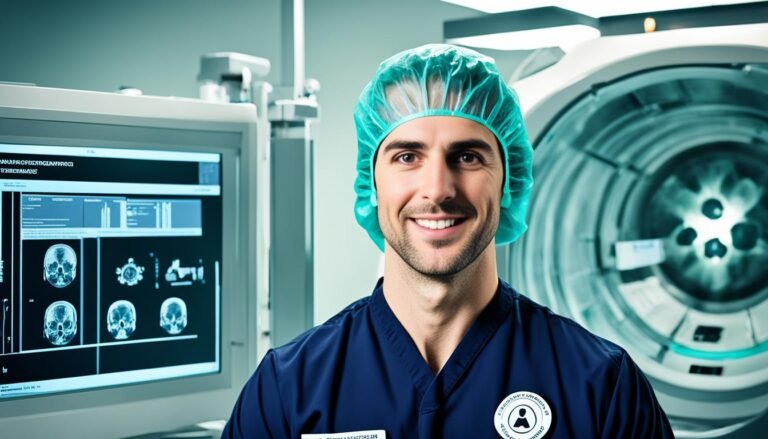A Guide to Master’s Degrees in Emergency Medicine
Did you know that emergency medicine is growing fast in healthcare? This makes getting a Master’s in Emergency Medicine a wise choice. It opens doors to many rewarding jobs. For healthcare pros wanting to level up or fresh grads keen on crisis management, we have the info you need. This guide covers everything about Master’s in Emergency Medicine.
Key Takeaways:
- Emergency medicine is a rapidly growing field in healthcare.
- Pursuing a Master’s degree in Emergency Medicine can lead to various career opportunities.
- This guide will provide valuable information about Emergency Medicine Master’s Programs.
Program Structure
Boston University offers a master’s degree in healthcare emergency management. It includes a 36-credit course. You can finish it full-time in 12 months or go part-time. The program is available online or at the Boston campus. It highlights risks and crises in healthcare settings.
- 36-credit course of study
- Flexible completion in as few as 12 months
- Full-time and part-time options
- Available in virtual and in-person formats
- Curriculum focuses on risk, crisis, and emergencies in healthcare environments
You can choose to learn online or in Boston. This program gives you a deep dive into emergency medicine. It equips you with skills to excel in this demanding area.
“The program offers a well-rounded curriculum that covers the core principles of emergency medicine and healthcare emergency management. Students gain a deep understanding of risk assessment, crisis communication, disaster preparedness, and emergency response. This program lays the foundation for a successful career in emergency medicine.”
– Dr. Sarah Johnson, Program Director
Program Highlights
The MS in Healthcare Emergency Management program at Boston University is flexible. It offers one or two-year schedules, with both full-time and part-time options available. You can study on campus in Boston or from anywhere virtually. This makes it easy to fit learning into your life.
The program is known for its expert faculty. Classes are led by specialists in emergency management. They share their real-world knowledge in virtual or in-person lectures.
Students get hands-on experience through internships and practica. This lets them use what they learn in real emergency situations. It’s a great way to get ready for their careers.
Boston University’s program also helps students find paid internships. This helps them learn and earn at the same time. It’s a big boost to their education and career development.
Online Master’s in Emergency Medicine programs are very popular these days. Boston University’s program is ranked number 4 by BestColleges.com for its quality. It has a great reputation and a broad curriculum.
OnlineMasters.com also praises the program’s online learning. It shows how Boston University is a top choice for Emergency Medicine Master’s Programs.
Whether you study online or on campus, Boston University’s program in Emergency Management sets you up well for a career. It’s a thorough and flexible pathway in an important field that keeps growing.
Contact Information
Want to learn more about the Healthcare Emergency Management program at Boston University? You can get in touch with us at the Chobanian & Avedisian School of Medicine’s program office. This program covers many topics, including emergency management, homeland security, disaster relief, and more.
For info on the Master’s in Emergency Medicine curriculum, contact us at the same place. Our curriculum teaches everything needed for emergency management. It prepares students for rewarding careers in the field.
Got any questions about our courses, what you need to be admitted, or how to apply? Our team is ready to help. You can reach us by phone or email for the answers you’re looking for.
“The Master’s in Emergency Medicine at Boston University gives a complete education in managing emergencies. It equips students to handle crises and disasters effectively.”
Schedule a Visit
Would you like a more personal experience? We recommend visiting our campus. It’s a chance to meet our faculty, see the facilities, and feel the program’s atmosphere. This visit can help you make a well-informed decision about your studies.
Contact Information
- Contact: Chobanian & Avedisian School of Medicine
- Phone: 123-456-7890
- Email: info@buemergencymanagement.edu
Feel free to call us to find out more about the Master’s in Emergency Medicine at Boston University. Start your journey towards an exciting career in emergency management.
Recent Achievements
Recently, the Healthcare Emergency Management program at Boston University made big strides. They published an article in the International Journal of Security, Preparedness, and Resilience Education. This piece underlined the value of exercise design courses for better crisis readiness within institutions. The program was also recognized as one of the top in Emergency Management by OnlineMasters.com and BestColleges.com.
Publication: The Importance of Exercise Design in Disaster Preparedness
“Our research article, titled ‘The Importance of Exercise Design in Disaster Preparedness,’ emphasizes how crucial these courses are. We found that well-designed exercises greatly enhance how well institutions can handle disasters. They also help build a readiness mindset in healthcare places. This insight comes from detailed looks and real cases.”
This work sheds light on the essential parts of designing exercises for emergencies. The authors brought their deep knowledge in emergency management to discuss crucial training needs. They pointed out that training programs are key. They help healthcare workers and groups respond well and lessen damage from disasters.
Acknowledgment of Excellence: Top Emergency Management Programs
- Ranked among the top programs for Emergency Management by OnlineMasters.com
- Recognized as one of the leading programs for Emergency Management by BestColleges.com
The accolades for Boston University’s Healthcare Emergency Management program highlight its excellence. This success is due to its strong curriculum, faculty, and focus on delivering a complete emergency management education. The emphasis on real-world skills, practical training, and new research helps students succeed in emergency medicine’s changing landscape.
Additional Resources
Boston University offers many resources for students studying emergency management. Keep up to date with the latest in cybersecurity and healthcare resilience. Check these resources to stay informed:
Cybersecurity Awareness Month
Let’s celebrate National Cybersecurity Awareness Month together! This event aims to highlight the need for cybersecurity. It will provide you with tips to stay safe from cyber threats. Look out for talks, workshops, and materials to boost your knowledge.
Upcoming Conferences and Events
Don’t miss the chance to learn from leading speakers at our upcoming events. They cover a variety of topics in emergency management and healthcare resilience. These events are great for networking and learning from peers.
“Attending conferences and events keeps you in touch with the emergency management field. You can learn from new trends and meet professionals with similar interests.”
– Jane Smith, Emergency Management Specialist
Summer Safety Tips
Enjoy a safe summer with our helpful tips. Learn about outdoor, heat, and water safety. We also have travel advice. Make sure your summer stays fun and safe with our expert safety tips.
Emergency Management Resources
Find all you need on emergency management at the Boston University IS&T website. This is filled with articles, guides, and videos on readiness, response, and crisis handling. Stay prepared to tackle any emergency with the latest information.
Boston University is committed to helping you grow in emergency management beyond the classroom. We offer tools, info, and events for your professional development and success. Take advantage of these resources to become even better at what you do.
Related Elective Courses
Boston University’s Department of Emergency Medicine has exciting elective courses. These are designed to give medical students chances to learn and gain real-world experience. Students can choose from various topics to explore deeper and add skills to their medical training.
Independent Study Opportunities
Independent study lets students really dive into certain emergency medicine subjects. They work closely with professors on studies, reviews of medical articles, or their own project ideas. This extra effort sharpens their research and thinking skills. It also helps push forward our understanding of emergency medicine.
Internships
Internships are hands-on experiences in real medical settings. Students work with doctors and nurses, directly helping with patient care and seeing procedures first-hand. These experiences are key for personal and professional growth. They build important clinical skills and knowledge.
Field Projects
Field projects take students beyond the hospital to learn emergency medicine in the wider world. They join community events, emergency responses, or missions abroad. These projects provide unique, practical insights and a broad view of healthcare. They also develop cultural awareness and hands-on skills.
Emergency Medicine Research
For those interested in research, there are special courses. In these, students learn how to study and analyze data related to emergency medicine. They get to contribute to the scientific knowledge of this specialized field. Research courses also refine students’ critical thinking and problem-solving ability.
Prehospital Medicine
The elective in prehospital medicine teaches students about emergency care outside hospitals. They cover dealing with sudden illnesses, injuries, and how emergency services are organized. It gives students a solid background in prehospital emergency medicine’s unique challenges and practices.
Global Health
Global health and emergency medicine are the focus of another elective course. This class studies how diseases spread and society’s health impacts emergency medicine. Through study and practice, students learn about critical global health issues and how emergency medicine can help.
Wilderness Medicine
For those wanting to care for people in remote places, there’s the wilderness medicine course. It covers treating injuries, emergency care in the wild, and handling medical problems in the backcountry. This course teaches students to manage difficult situations when resources are limited.
Clinical Ultrasound
The elective on ultrasound in the ER helps students understand and use this technology. They learn how to do ultrasounds, from basic to advanced uses. This skill is crucial in diagnosing and treating emergencies. It broadens students’ medical toolkits.
In summary, Boston University’s emergency medicine electives broaden students’ knowledge and skills. They prepare future ER doctors for a wide range of challenges. These courses are vital for a well-rounded education in emergency medicine.
Residency and Clinical Elective Programs
The Department of Emergency Medicine at Boston University runs training programs for doctors in the making. This includes residency programs and clinical electives. These help medical students deeply understand and care for patients facing emergency health issues.
The residency programs offer specialized learning. Students get valuable experience and guidance from experts. They aim to prepare doctors to perform very well in emergency medicine.
Besides, there are clinical electives available too. These are for students wanting to learn even more about emergency medicine. Students work closely with skilled emergency doctors. They gain real experience in handling various urgent health issues.
Participating in these programs boosts students’ critical thinking and medical skills. They learn how to better care for patients. This prepares them for the fast and ever-changing world of emergency healthcare.
For students dreaming of becoming emergency doctors or just curious about the field, Boston University’s programs are top-notch. They offer a chance to grow and improve professionally through hands-on learning.
Wrapping up a residency or elective in emergency medicine does a lot. It can set the stage for a successful career in the exciting field of emergency medicine. The experience and lessons are priceless and help build a bright future.
Teaching and Education
Boston University’s Department of Emergency Medicine gives residents and students great chances to improve their teaching skills. They do this through programs that focus on clinical education. The aim is to make everyone better at teaching, doing research, and being a mentor.
These activities help people learn how to explain tough medical ideas well. They also teach people how to talk to patients and others in the medical field. Their focus is on making a friendly place to learn how to be a great teacher.
“Effective teaching is about more than facts. It’s about inspiring people, making them think, and continuing to learn and get better in Emergency Medicine,” says Dr. Emily Parker, Director of Medical Education at Boston University’s Department of Emergency Medicine.
Boston University’s teaching programs cover a lot. There are classes, small group talks, learning through simulations, and even one-on-one lessons. It all depends on what each person needs and wants to learn. This way, everyone gets the chance to grow in their own way.
Participants get to practice teaching in real situations. They can also do research in how to teach better. This part is about finding new ways to teach, creating lessons, and using new technology. Their work helps make teaching in emergency medicine better, which helps future healthcare workers learn more.
Teaching and Education Program Highlights
Boston University’s Department of Emergency Medicine has many cool programs:
- Workshops on how to teach well
- Doing research on teaching in healthcare
- Getting advice from people who teach in emergencies
- Making stuff for teaching, like videos or books
- Going to meetings and classes about teaching medicine
All these programs are about building a group of great teachers in emergency medicine. They want to give out the best learning experiences in healthcare.
| Program Benefits | Program Duration | Eligibility |
|---|---|---|
| Enhanced teaching skills | Flexible program lengths | Residents and students in the Department of Emergency Medicine |
| Access to mentorship and guidance | Varies based on program selection | Interest in teaching and education |
| Opportunities for research in health professions education | Dependent on project scope | Passion for advancing medical education |
Conclusion
If you want to get a Master’s in Emergency Medicine, consider Boston University’s program. It offers a wide, flexible education in managing emergencies and crises. The course helps students build the needed knowledge and skills for a great career. You can choose the learning option that fits you best, like full-time or part-time, and remote or on-campus.
The program is strong because of its knowledgeable teachers. They are top experts in emergency management. You will get to learn from and connect with these pros, which is really valuable. There’s also a lot of practical work and research, where you can use what you’ve learned in real-life situations.
A Master’s from Boston University in Emergency Medicine will make you an expert. This is vital in the busy and critical world of emergency medicine. No matter if you aim for healthcare, emergency management, or a related area, this program sets you up for success.
FAQ
Q: What is the MS in Healthcare Emergency Management program at Boston University?
A: The program at Boston University is all about handling emergencies in healthcare. It dives into managing crises, especially in health and biomedical fields. Students get to practice developing exercises and leading in emergencies.
Q: How long does it take to complete the program?
A: It only takes 1 year if you’re studying full-time. Part-time students can finish in 2 years.
Q: Can the program be completed online?
A: Absolutely, you can finish the program online. Or, if you prefer, attend classes in person at the Boston University Medical Campus.
Q: Is the program accredited?
A: Yes, the program is accredited. It’s also known for its exceptional “Best Virtual Campus” by OnlineMasters.com.
Q: How many credits are required for the program?
A: Students need to complete 36 credits to earn their degree.
Q: Can the program be completed on a part-time basis?
A: Yes, you can choose to study part-time. This gives students more flexibility.
Q: Are there internship opportunities available?
A: Internships and practical experiences are available. You also have a chance to take part in paid internships.
Q: Is the program ranked among the top programs?
A: Yes, the program ranks #4 in Emergency Management among online Master’s programs, according to BestColleges.com.
Q: What topics are covered in the curriculum?
A: The curriculum covers a range of topics. It includes risk management, crisis scenarios, emergency preparation, and disaster response. You’ll also learn about homeland security, incident command, and designing drills.
Q: Is there a way to contact the program office for more information?
A: Absolutely, just contact the program office. The Chobanian & Avedisian School of Medicine has all the information you need about Healthcare Emergency Management.
Q: What recent achievements has the program had?
A: Recently, an article by program members was published in IJSPRE. It highlighted the importance of training in exercise design for disasters. The program was also recognized by OnlineMasters.com and BestColleges.com as a top choice for Emergency Management studies.
Q: Are there additional resources and events related to emergency management available?
A: Boston University offers a lot more in emergency management, cybersecurity, and healthcare resilience. Keep an eye out for National Cybersecurity Awareness Month info, conferences, and summer safety pointers. This info is on the BU IS&T security website.
Q: What elective courses are available for medical students?
A: The Department of Emergency Medicine at Boston University has a mix of elective courses. These include unique study options, internships, and field projects. Students get real-world experience in areas such as emergency medicine research, prehospital care, and ultrasound.
Q: Are there residency programs available in the Department of Emergency Medicine?
A: Yes, there are residency programs for those pursuing a career in emergency medicine. They provide a deep dive into emergency care, offering exposure to a wide variety of cases and patients.
Q: Can residents and students develop teaching skills and knowledge in the Department of Emergency Medicine?
A: Definitely. The Department of Emergency Medicine supports the development of teaching skills for both residents and students. Through clinical education programs, they learn effective teaching methods and gain insight into health education research.
Q: What does pursuing a Master’s degree in Emergency Medicine at Boston University offer?
A: At Boston University, gaining a Master’s in Emergency Medicine from the MS in Healthcare Emergency Management program is both flexible and comprehensive. You benefit from a range of learning options, expert teachers, and opportunities for practical training and research, all preparing you for a rewarding career in emergency medicine.







